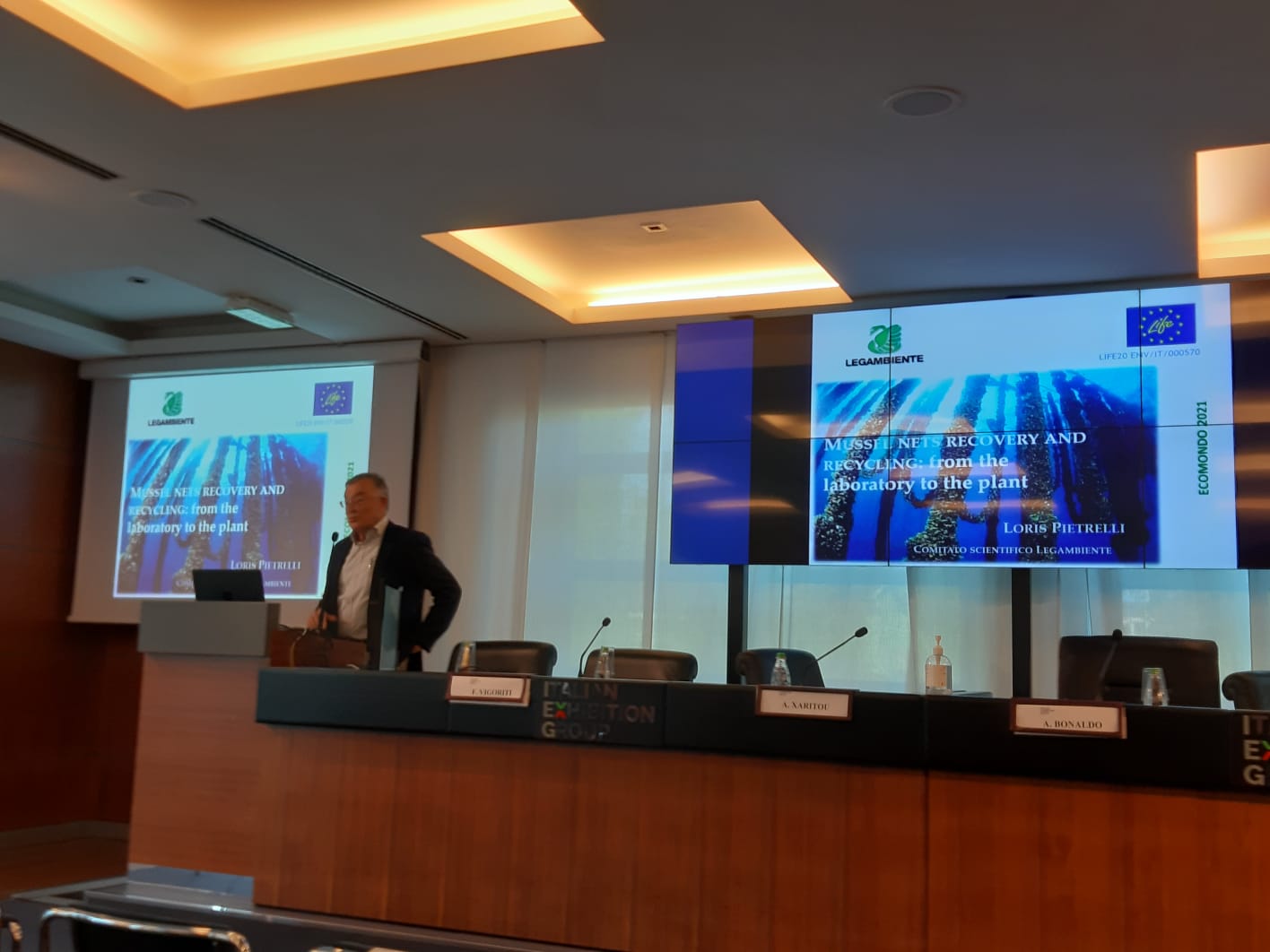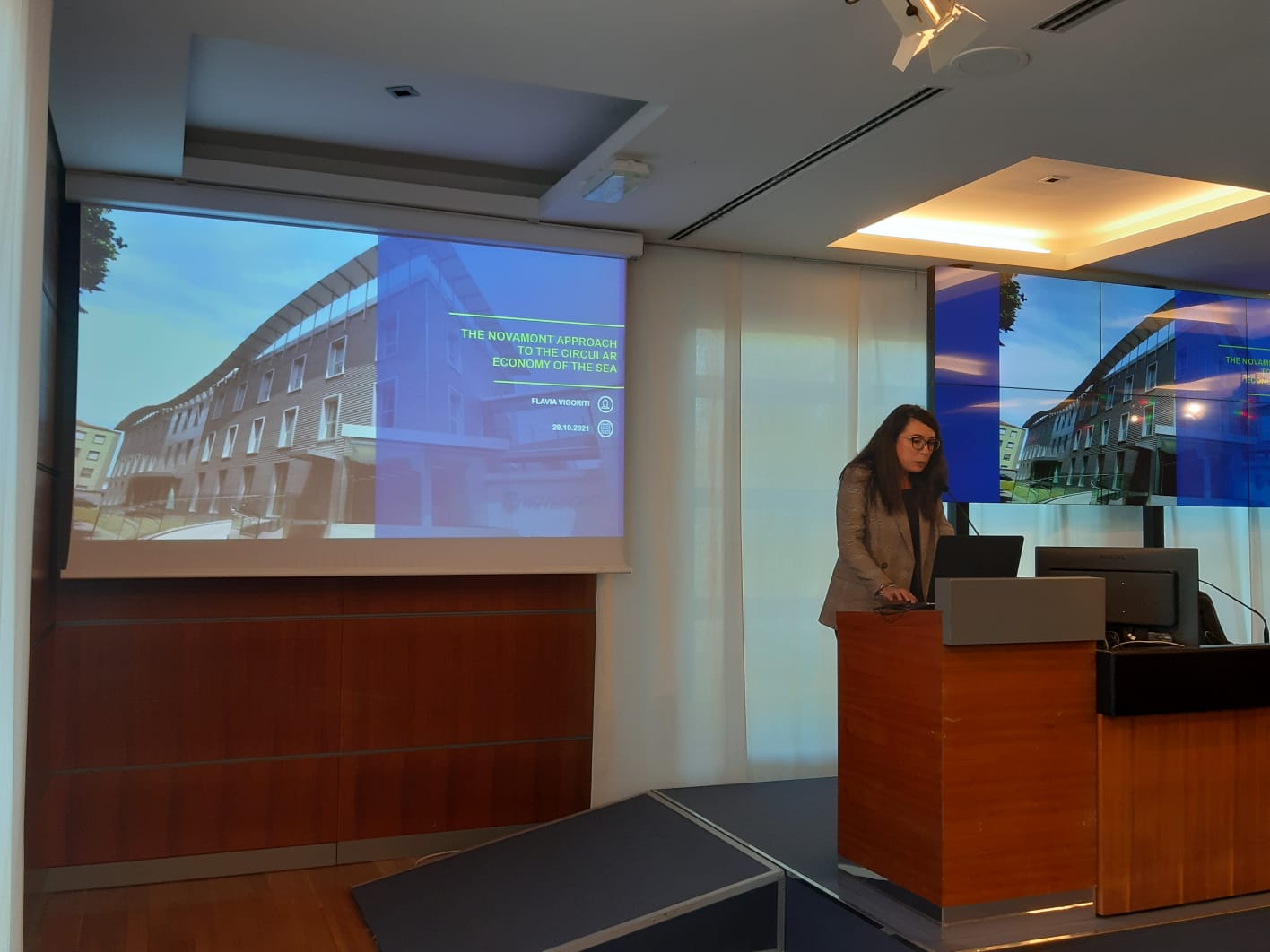
Presentation of Life Muscles at Ecomondo
Sustainable aquaculture, a second life for the nets used to raise mussels
Presented at Ecomondo, the green and circular economy fair, the new Legambiente project LIFE Muscles: the circular economy for tubular nets used in mussel farming
Fishnets are the third most common plastic waste found on the seabed in Italy and account for approximately 27% of waste found on European beaches
Transforming a part of the aquaculture sector from a cause of sea pollution to a virtuous model of circular economy with the aim of protecting the marine ecosystem and economic activities linked to the sea. And the mission Of LIFE Muscles, the new project – co-financed by the programme LIFE extension of the European Commission and coordinated by Legambiente – which started in recent days and was presented this morning during a conference organized in Rimini as part of Ecomondo, the international fair of the green and circular economy world, by Legambiente and the University of Siena. The technical part, moderated by Professor Maria Cristina Fossi of the University of Siena, saw interventions that recounted the project and various experiences already implemented at an international level, while in the political round table, coordinated by Francesco Loiacono, director of New Ecology, I am representatives, among others, attended by UNEP-MAP, ISPRA, the Ministry of Agricultural and Forestry Policies and the Mediterranean Aquaculture Association, as well as Legambiente.
Specifically, LIFE Muscles aims to reduce the impact of polypropylene nets used for mussel farming introducing a recycling and reuse model among mussel farmers that would benefit both the health of our seas and the economy of this sector. In fact, the plastic nets installed in the sea for mussel farming, often abandoned or dispersed, they represent around 27% of plastic waste found on European beaches for a total weight that can reach 11 thousand tons per year. This is why the new LIFE Muscles project, presented today in the setting of Ecomondo, is attended not only by the leader Legambiente but also by the universities of Siena, the Alma Mater Studiorum of Bologna, La Sapienza of Rome, together with Rom Plastica, Novamont, the only company in Italy that produces “mater-bi”, the Mediterranean Aquaculture Association and two mussel farmers' cooperatives they operate in the areas of La Spezia and the North of the Gargano.
In 2016, worldwide production of propylene nets for mussel farming reached 2.14 million tonnes, with a quarter of this huge amount concentrated in European waters. According to data from the FAO, the production of mussels in Italy is estimated at around 80,000 tonnes which corresponds to the use of around 700/1000 tonnes of nets which need to be replaced at least once during the life cycle of the mussel. In the monitoring carried out in 2017, Legambiente found 4,470 of these tubular networks in 27 of the 60 coastal roads sieved. According to what emerged from the international cross-border cooperation project DeFishGear, focused in Italy in the Adriatic Sea and in the Ionian Sea, these networks constitute the third most present waste in the seabed of our country, with an annual dispersion that stands between 7.88 and 9.45 tons.
But what is the solution proposed by LIFE Muscles (Life Mussel Sustainable production (re)cyCLES)? Implement the recycling process already developed in 2019 by Enea and AMA, in collaboration with Legambiente, which demonstrated how recovered polypropylene has the same properties and can be reused. The process consists in the washing and recycling of the material through the shredding of the tubular nets, the oxidation of the residual organic material, in the washing and finally in the reuse of the recovered polypropylene. Now with LIFE Muscles the aim is to increase this production and be able to involve various stakeholders (mythic growers, distributors and consumers) to spread its use. Furthermore, Novamont, partner of the Life MUSCLES project and the only company that produces 'mater-bi' in Italy, has applied this process to the creation of biodegradable nets for mussel farming obtaining satisfactory results which will be further validated during the Life Muscles project .
The pilot areas involved in the project are in the Adriatic Sea (Puglia) and in the Tyrrhenian Sea (Liguria). The new biopolymer and biodegradable nets will be offered to the mussel farmers present in Liguria, and therefore the replacement of the plastic nets; while the operators of the sector in Puglia will be involved in the recovery and recycling of the nets thanks to a mobile plant to be positioned in the port areas or at the mussel farms, capable of recycling 300 kilograms of material per day.



"We know how difficult it is to be able to introduce technological innovations in a sector with a strong traditionalist character such as fishing - declared the president of Legambiente Stephen Ciafani – But we have already had several positive experiences in other projects and we are sure that also with LIFE Muscles we will get a satisfactory response from fish and mussel farmers. Many have already been involved and are asking to be able to reduce the impact of plastic waste in our seas and on our coasts. With this model of recovery and recycling of socks for mussel farming we want to make a contribution to the ecological transition, while at a regulatory level it is necessary to follow up on the 'SalvaMare' bill which regulates the correct management of waste recovered at sea to protect the marine ecosystem ”.
“The problem of marine litter is very important on a global level, even more on a Mediterranean scale as our basin is a biodiversity hotspot but also a hotspot for human pressures, including marine litter – he explained Maria Christina Fossi, full professor of Ecology and Ecotoxicology at the University of Siena – In order to mitigate the impacts associated with the production and use of plastic materials in fishing and aquaculture, a synergy between the world of research, industry and the stakeholders involved at various levels in these activities. Research must be a beacon for the development of sustainable solutions also, and above all, in the identification of alternative materials that must be developed and tested to reduce their negative impact on biodiversity. These aims represent some of the main objectives of the LIFE Muscles project of which the University of Siena, which has been working on this issue with Legambiente for years, is a scientific partner”.





